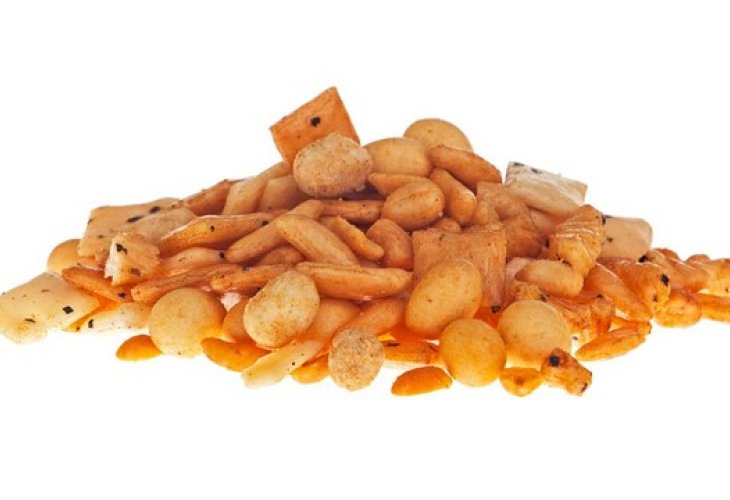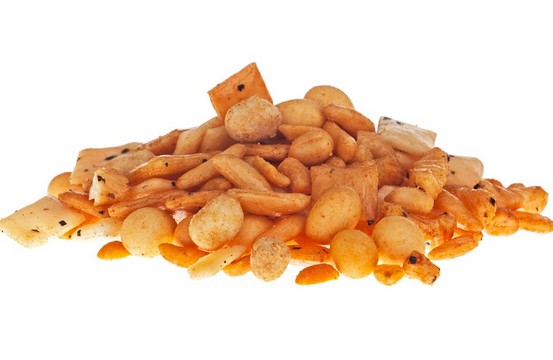Kashrut of Munchies
There is a kashrut issue that many good people "fall into." Although they buy Shabbat nuts only from stores that provide strictly kosher merchandise, when it comes to munchies or wasabi, they don't ask about the kashrut of these products, whether they have the same certification as the store, or why they are in sealed packaging rather than sold in bulk.

We have a rule that any food that does not appear on a king's table - meaning not just those with crowns, but anyone considered "important people" - and if the food isn't significant enough to be served at their table, even if cooked by a non-Jew (in a way that doesn't involve prohibited ingredients), it is permissible to eat. Following this rule, a discussion arose among early authorities about whether roasted legumes prepared by non-Jews, such as roasted peas, could be permitted, since these snacks typically don't appear on a king's table. Indeed, many permitted this for this reason, as ruled by Maran Maor Israel zt"l. However, this rule isn't always applicable in practice, since some varieties do appear on a king's table, as attested by Rabbi Isaac Luria (the Arizal). Moreover, the situation has changed today, and it's now common to serve these foods even to important and high-ranking people.
We should note that the authorities' discussion only applies when the legumes are roasted. If they've undergone any cooking process, no one would permit them, because the same Rambam who wrote "roasted foods of non-Jews are permitted, and they did not decree against them because a person does not invite his friend over roasted foods" wrote in the following law: "Beans, peas, lentils and the like, which non-Jews cook and sell are forbidden because of bishul akum (non-Jewish cooking) in places where they are served at a king's table as an appetizer"... Maran zt"l has explained that the interpretation of Rambam's words is that all cooked legumes, such as chickpeas (hummus), are served at tables, and therefore if they underwent a cooking process, they are forbidden. Examples include "leblebi" (the Iraqi arbis) or the Indian snack that appears to be roasted...

The roasted peas, corn, soy, and fava beans aren't actually roasted, as they might momentarily appear due to their appearance and location in the store near other nuts, but are actually cooked by deep frying in oil, and only afterward undergo some process that gives them the appearance of roasted legumes. So they aren't included in the exemption of "a person does not invite his friend over roasted foods" that would allow us to permit them. Rather, they fall into the category of cooked foods, which according to all opinions requires Jewish cooking.
Until recently, the market situation was that almost all roasted peas, corn, fava beans, soy, and even munchies were not locally produced but imported from abroad, with kosher certification from overseas organizations. Unfortunately, these organizations are very lenient regarding non-Jewish cooking, and even the lighting of the fire isn't done by Jews. Let's judge them favorably that they rely on certain authorities who permitted this when done in a factory. However, this leniency "doesn't even meet the standard of regular rabbinical supervision."
Even if the label states "bishul Yisrael" (cooked by a Jew), one shouldn't expect too much. It likely means only that the fire was lit by a Jew, while the entire cooking process was done by a non-Jew - something forbidden for Sephardim according to the strict law, and even for Ashkenazim it's highly problematic. So the stumbling block was constant, and even in stores with strict kosher supervision, the product was available, though packaged separately, but customers weren't always aware of why...
The same applies to munchies - to familiarize you with the product, it's a type of mixture of all kinds of flours - wheat, corn, potato, soy - mixed with seaweed, peanuts, and various fats, with all numbers of food coloring and flavoring, plus yeast, proteins, and bread crumbs. These are baked into an impressive star shape called munchies. Even if we assume all these products were supervised and are indeed strictly kosher and checked for insects, which isn't at all certain, munchies are made in factories where almost all workers are non-Jews who put them into the ovens - classic non-Jewish cooking at its finest. So munchies had the same problem...
Recently, we received great news that due to the many issues, the head of the Badatz, Rabbi Moshe Yosef shlita, worked on an appropriate solution. For this purpose, he sent a special delegation to Holland and other countries in the region, led by the world expert on raw materials, Rabbi Yigal Ben Ezra shlita, until they found a factory that could meet kosher standards, and especially fund a team of kosher supervisors who would physically engage in the entire cooking process...
In conclusion, although today there are types of munchies with Badatz certification, the practice hasn't spread to all stores... So be careful about the product's kashrut, even when it has overseas certification... And especially stay far away from roasted fava beans and their counterparts. Do you know why? Simple! Fava beans are known as one of the most infested legumes, which can only be properly checked when they are split and peeled, as their thick skin hides the infestation underneath. So tell us... how were the fava beans checked before being fried, not to mention before entering our mouths... Perhaps in the future, a solution will be found for this too, with fava beans supervised for insects, and time will tell....

